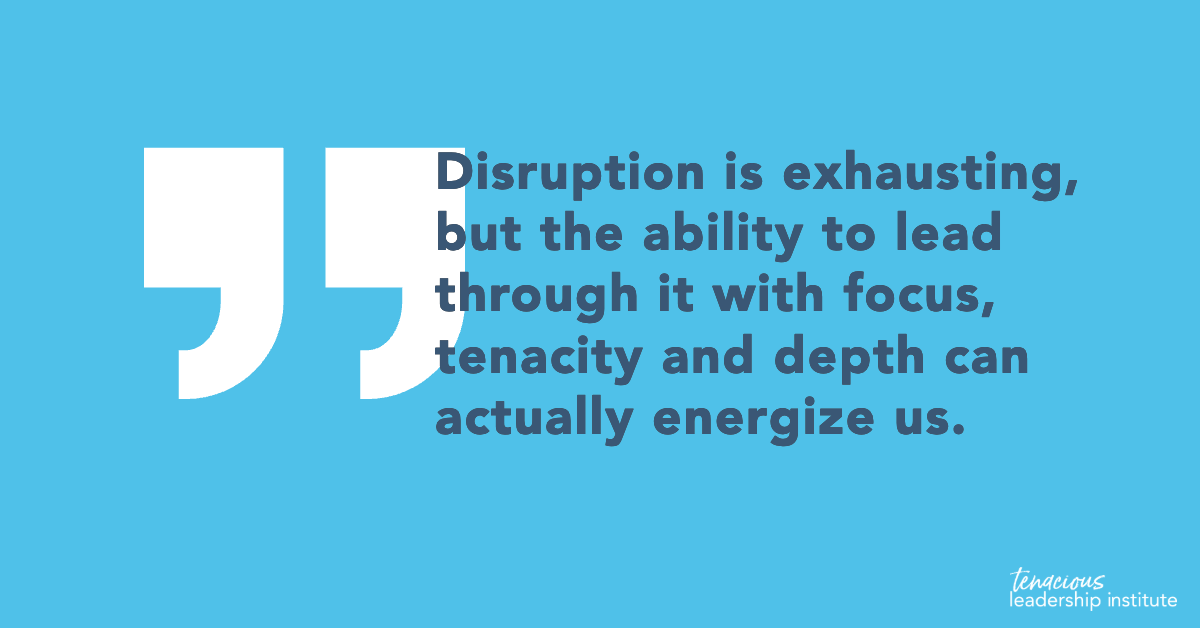5 Hidden Signs Disruption Is Actually Exhausting You (And How to Begin to Change That)
In times of disruption, the pressure to keep performing can cloud your awareness of how much it’s really taking out of you. While you may feel like you’re staying on top of things, there are subtle signs that the stress of constant change is quietly draining your energy.
Here are five hidden signs of exhaustion that many leaders experience during times of disruption:
1. Mental Fog and Decreased Focus
When disruption keeps you in a constant state of alertness, your brain's cognitive resources are depleted. The prefrontal cortex, responsible for focus, decision-making, and problem-solving, becomes overworked, making it harder to concentrate or think clearly. This mental fog can affect both big decisions and everyday tasks. Neuroscience suggests that prolonged stress impairs cognitive function by reducing activity in the prefrontal cortex, leading to a decrease in executive function.
How to change it: Start by incorporating mindfulness practices or short breaks to recharge your brain. Research shows that even five-minute mindfulness exercises can reduce cognitive fatigue and improve focus.
2. Increased Decision Fatigue
When you're constantly managing change, your brain experiences decision fatigue—making it harder to make clear, effective decisions. According to a study by the Journal of Behavioral Decision Making, leaders facing constant uncertainty experience a depletion of willpower, which causes them to either procrastinate or make impulsive decisions.
How to change it: Streamline your decision-making process by delegating where possible and setting up clear frameworks. By reducing the number of decisions you need to make, you conserve your energy for critical moments.
3. Physical Fatigue and Low Energy
Disruption affects not only your mental state but your physical health. The stress response—triggered by constant disruption—leads to the release of cortisol, which can impact sleep patterns, digestion, and overall energy levels. Over time, this chronic fatigue can leave you physically drained, even if you're getting enough sleep.
How to change it: Prioritize physical recovery by incorporating daily movement, stretching, or exercise into your routine. Studies show that even light exercise, like walking, can help regulate cortisol levels and boost energy.
4. Emotional Detachment from Your Team
When you’re constantly managing disruption, it’s easy to become emotionally detached from your team. You may feel disconnected or unable to provide the support your team needs. This detachment happens because of emotional exhaustion, where your brain’s empathy centers become overloaded by the constant demand to stay engaged and solve problems.
How to change it: Take time to reconnect with your team through regular check-ins and team-building activities. Restoring emotional connections with your team enhances trust and engagement, which leads to improved performance under pressure.
5. Reduced Creativity and Problem-Solving Ability
Continuous stress can impair your ability to think creatively or solve problems effectively. Neuroscientific research shows that prolonged exposure to stress reduces dopamine levels, which are crucial for motivation, creativity, and problem-solving. This leads to a lack of creative solutions and the inability to think outside the box when disruption demands it.
How to change it: Foster a culture of creativity by encouraging brainstorming sessions and allowing space for innovative thinking. Taking time to step away from the stressors of disruption—such as through creative activities or time outdoors—can help replenish your brain’s capacity for creative problem-solving.
Leadership Practice
3 Strategies to Combat Disruption Fatigue
Take these three steps to address the hidden exhaustion of disruption and regain your mental and physical energy:
Practice Self-Awareness: Identify the signs of fatigue in yourself and your team. Are you feeling overwhelmed, mentally foggy, or disconnected? By recognizing these signs early, you can take action before burnout sets in.
Prioritize Restorative Practices: Implement daily practices that restore your energy. This could include mindfulness, physical exercise, and adequate rest. Aim to build small habits that allow for quick mental resets throughout the day.
Delegate and Simplify Decision-Making: Cut through decision fatigue by delegating non-essential decisions to others and streamlining processes. Focus your energy on the decisions that will move your organization forward during disruption.
Author
Athena Williams, Founder and CEO of Tenacious Leadership Institute, has been supporting leaders worldwide to become more tenacious for over 20 years. She has found that tenacity is the key to sustained leadership success in today’s ever-changing world. Through her coaching and leadership development programs, she helps leaders expertly handle change, complexity and other challenges so they can quickly get better results for themselves, their teams and their organizations.
Take the first step to becoming a tenacious leader by scheduling a call with us.



